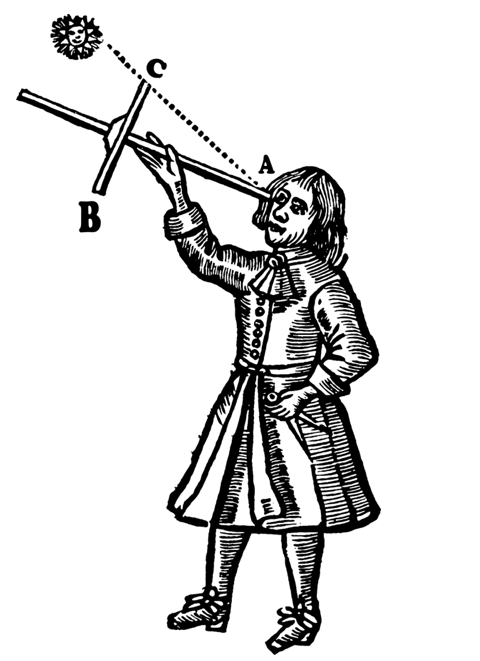PUBLIC DEFENCE – Johan Nielsen
“Remote Practices. Insights on Architectural Design Processes”
- Date: 11 October 2022
- Location: Campus Brussels/LUCA, Paleizenstraat
- Timing: 4 p.m. CET
Image: Man with a Jacob’s staff, from John Sellers’ Practical Navigation, 1672. Source: wikiwand.
Abstract
The effects of climate change, recent geopolitical events and the global pandemic show us that physical limits and capacity of movement take new meanings and increase the interest to understand the world across its frontiers. To understand how our interdependent world is fragmented, alternative views must be proposed to the antagonism globalization – localism commonly accepted as a major framework of reference in the last decades. This antagonism led to uncomplete views on the reality of the architectural practices, putting strong focus on standardization and local identities as opposing dynamics. However, the abandonment of this antagonism contributes to enhancing a state of confusion, notably in architectural critique. As an alternative point of view, the research proposes to consider remoteness in the architectural practice as a key notion to overcome dichotomies in the understanding of the changes at play in the discipline. Working remotely becomes common for architects. Nevertheless, it must be carefully considered as it has significant effects on architectural practices, design processes, office structuration and status of stakeholders.
The research examines the particular case of architectural offices committed to contextual design that are having the opportunity to develop projects overseas. In the context of a fine-grained international culture of architecture, many offices have the occasion to design in foreign locations, without relevant experience of the physical context, the local cultures or know-hows. The design of suitable proposals appears then as a paradoxical enterprise. The research considers that the observation of the design processes of such remote practices contributes to understand and prepare the changes occurring in the discipline. This observation is structured around a transdisciplinary theoretical framework, based on the notions of interpretation and representation rooted in the hermeneutical phenomenology of philosopher Paul Ricœur; the sense of locality as proposed in the writings of the military theorist Carl von Clausewitz; and the interplays between negotiation of collective spaces and local communities through the theories of the regimes of engagement and the grammar of commonalities as developed in pragmatic sociology. Four cases are surveyed, in Tirana, Paris, Ljubljana and Basel, designed by emerging offices from Brussels, Tokyo, Zurich, Santiago-de-Chile, Glasgow and Barcelona. Their design processes are examined through close reading of working documents, interviews with key stakeholders, mapping of intermediate project versions and, as the case may be, building review. In the framework of the research, contributions are made on the improvement of several dynamics at play in remote practices as well as on education of architects and other stakeholders in order to prepare them to operate in critical conditions. In this, the research contributes to face contemporary and future crisis and to detect and understand the effects on the architectural discipline. Also, in turning unfamiliarity and strangeness into positive and operative notions, the research calls to reconsider, on an ethical positioning, the status of the architect as a stranger, detecting and framing the expression of a multiplicity of voices across personal and collective spheres in order to encourage critical conversations and sound confrontation between different points of view.
